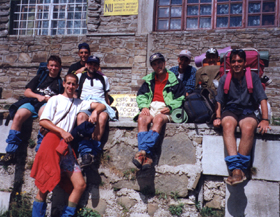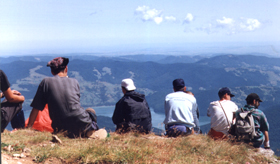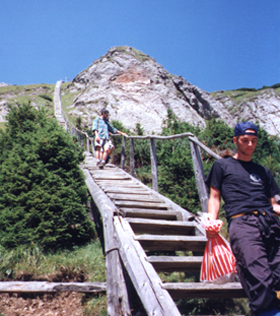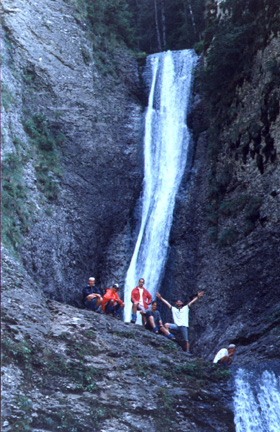

Monday, August 10: A heavy fog, more like a ground-level cloud, surrounds everything as we groggily rouse ourselves. We go back to sleep for a while but soon break "camp" and, shortly before nine, T.V., András, Otto and I wander off in the mist to the Dochia. My feet are damp in my boots. We can't find the others. Finally, we shout and are reunited. In another hour the fog has lifted and the clouds are visible below us. We are above the cloud line. We breakfast -- the usual fresh white bread, jam, local cheese -- at a picnic table that seems perched on the roof of the world. I stick my arms out in front of me and if I don't look down, have the distinct illusion that I'm flying.
Throwing caution to the winds, I pass up bottled water and drink directly from the cold spring near the monastery, in which we also wash our hands and brush our teeth; it tastes metallic, but my bet that the springs up here would play less havoc with my digestive tract proves to be a good one.
In another hour, the scene sort of looks like Kauai to me...yeah, gotta get back to Kauai...
Sometime during the day, we pick blueberries on a nearby hill.

Eventually, we set out on the day's main event: climbing Toaca, most of the way via the steepest wooden staircase I'd ever seen. These steps are weathered, gray, and badly put together, a rudimentary banister is only present in sections, and the whole leads up to an unseen vanishing point on the peak, on which is our goal, an abandoned weather station. I instantly nickname this thing the Stairway of Doom (or was that Stairway of Impending Doom? Or Stairway of Death?). For a stupid reason I am carrying a plastic bag filled with a camera and other odds and ends, which I soon regret taking along; Danni says he'll bring it up for me, since I have my hands full navigating the stairs, and I sheepishly let him.
Let the vertigo begin. The stairs are broken in a couple of places, and we have to scramble off and on; towards the top the steps completely give out, and we finish the climb scrambling on hands and knees up the mountain. I am amazed that the Romanian authorities would allow people to use such a staircase, and complain to Attila; in the West, a structure in better condition would have been condemned long ago. But this ain't the West; fortunately, we all survive to get spectacular views of the surrounding mountains for miles in all directions. I raise my water bottle and, in a semi-serious toast, shout, "Romaniaaa!" to Tivadar.

Greeting us at the very summit, several feet higher, is a hand-lettered sign reading "ZONA LIBERA DE NEOCOMUNISM." Romanian wit at a high level; I snap a picture. Bees buzz around us; groups of hikers shout to one another. Peter, a wiry guide who'd joined us for this expedition, tells me that up on this weather station in the winter, the wind is so strong that the icicles freeze horizontally.
The hike down from Toaca was just as rough, if not worse, as we had to be even more cautious to keep from tumbling down.
On any other day, Toaca would have been the dominating event. But in keeping with Outward Bound's sneaky way of operating, springing challenges on you when you least expect them, it turned out to be, if not an appetizer, then the first and lesser of two main courses.
It started off as a pleasant afternoon diversion, a simple hike to a waterfall named Cascada Duruitoarea. As we proceeded downhill, then even more downhill, and downhill still more, on an alarmingly steep gradient and a not very firm forest surface, I pictured the climb back up and alarm bells rang. But I kept going with Attila, Csongi and the guys, not wanting to give up, be an exception, be weaker. Finally we reached our destination, a nice enough if not spectacular cascade; I was tired and didn't join the others in scrambling up the rock to the base of the falls.
On the way back I realized my future, which was even worse than I'd let myself admit to myself. It seemed as if every step brought me to my limit, but I couldn't stop there. I had to keep going and I kept collapsing for rest, gasping for air all the way back. As I'd done on a previous hike near the Sovata camp, I started cursing in Slovene, knowing the others wouldn't understand. Maybe I said some things in English too, probably I did, out loud everything I was thinking, the social filter off. I'd curse in Slovene as we'd zigzag our way up and down a steep hill in a forest, prekleta pizda, sovrazhim. I hate this. This is a mistake. I don't want to do this ever again. I am physically, mentally, and spiritually exhausted.

But strangely enough, all the others seemed to understand. Csongi and Attila and the others waited patiently while I recuperated, making the hike back twice as long as it would have taken them otherwise, or more. We would sit and talk quietly, I've forgotten everything we said, didn't matter, then Attila would say to the group, softly, "Let's go," and we would.
And of course I didn't give up, and finally we all made it back. I didn't think it was possible to be so tired and still go on.
"This program is designed to help people test their limits," Csongi told me sometime later. "At some points today, you came close to it." No kidding. But I'm incredibly happy to have made it through with difficulty, but honorably. So these, I think to myself, are my limits.
We sit down to a rare indoor meal, a well-earned dinner at the Dochia; everyone's in an expansive mood, realizing they've made it over the biggest hump, and I finally try my first plate of Romanian mamaliga, a national dish rather like Italian polenta, i.e., cornmeal mush, which arrives in a huge pile on the plate, three times as much as anyone could want, with a liberal helping of not especially good grated cheese. I finish the meal, have my first sip of the Dochia's patented worst coffee I've ever had in my lifetm, grimace and say the name of the Christian God with special emphasis, and one of the guys across the table laughs. I don't mind.
The conversation turns to the USA. I listen to everyone's comments about, oh, I don't remember anymore, probably about plans to visit, and suddenly I can't take it anymore, I know they're just kids, but I have to tell them something about why I left. I start talking about the paranoia, the sad fact that in America, and no one ever talks about this, do they, but strangers tend to fear one another; the unchecked consumerism, the confusion of shopping with happiness; the endless chase for something better; and the fact that many people in America lead empty, unfulfilled, dissatisfied, unhappy lives. Maybe I also talk about the segmenting, the pigeonholing by marketing surveyors. I don't remember anymore.
Everyone at the table falls silent, hanging on everything I say as if I'm delivering the Revealed Word. I realize I've broken some sort of barrier. For perhaps the first time on the trip, the cultural barrier between me and the others drops away; they realize I'm trying to communicate something genuine to them, and I realize they realize it, and they'll possibly remember this moment, too.
The moment passes, of course. Attila leads us in the Desert Island Game: we each draw slips of paper stating an identity we're to assume, and try to convince the others to let us not be thrown to the sharks on an island where resources allow only some of us to survive. I am rather startled when I draw the character of "whore." Finally, however, we've arrived at a game I'm good at; I invent a magical chameleon-whore who can be gorgeous woman, stunning man, or comely sheep, and garner the most votes in the end. "The whore always stays on the island," Attila later remarks.
With the guides wary of night precipitation, we spend the night on the Dochia's concrete porch, sheltered by an overhanging roof. The view is matchless. Before dropping off to sleep, I watch separate fires from two camps on a near hill to my right; the white smoke from both fires rises and mingles, highlighted against the dark green of the pines.

Of course, it doesn't rain.
The killer day, the fulcrum day, was over.